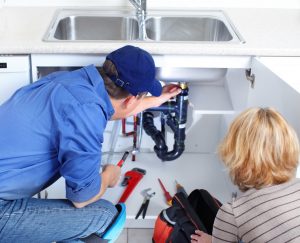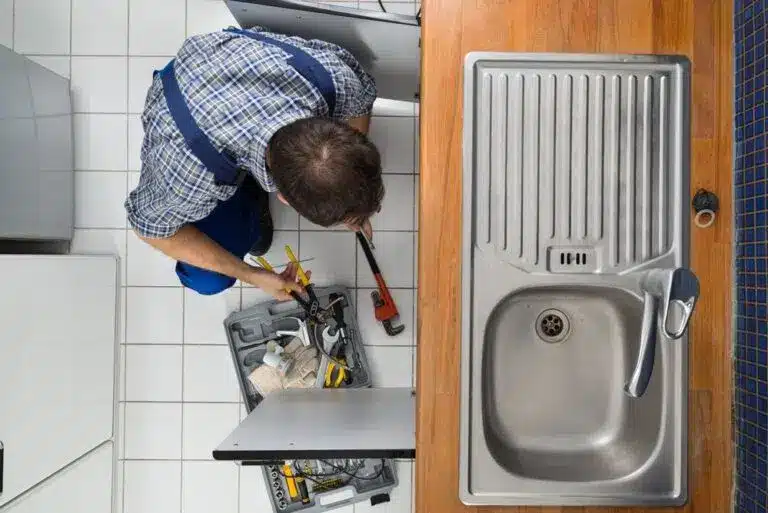Straightforward Ways to Repair a Leaky Waste Disposal Unit
Contact UsThis great article which follows pertaining to Tips on Fixing a Leaking Garbage Disposal is relatively insightful. Have a go and make your own personal ideas.

Waste disposal unit are necessary cooking area home appliances that assist in dealing with food waste effectively. Nonetheless, a leaking waste disposal unit can be a frustrating and messy problem to manage. Fortunately, numerous leaks can be fixed easily with a couple of easy steps. In this short article, we will discuss exactly how to take care of a dripping garbage disposal properly.
Introduction
Waste disposal unit are installed under cooking area sinks and are made to shred food waste right into smaller sized items, enabling it to pass through the plumbing system conveniently. While these tools are typically reputable, leaks can take place with time due to deterioration, loosened links, or damages to the device.
Typical Reasons For Leaks in Rubbish Disposals
Worn Seals and Gaskets
Seals and gaskets play an essential function in preventing water from leaking out of the waste disposal unit. Gradually, these elements can weaken, leading to leakages around the disposal device.
Loose Connections
The connections in between the waste disposal unit and the pipes system can end up being loosened gradually, creating water to leakage out during procedure.
Cracks or Openings in the Disposal Device
Physical damages to the waste disposal unit, such as fractures or holes in the real estate, can additionally cause leaks.
Identifying the Resource of the Leakage
Before trying to take care of a dripping garbage disposal, it is essential to identify the source of the leakage. This can commonly be done with aesthetic evaluation or by performing easy examinations.
Visual Examination
Evaluate the garbage disposal unit carefully for any kind of signs of water leak. Pay close attention to locations around seals, gaskets, and link points.
Examining for Leakages
One way to check for leaks is by running water through the disposal unit and looking for any noticeable signs of leakage.
Tools and Materials Needed for Dealing With a Dripping Waste Disposal Unit
Prior to starting the fixing process, gather the required tools and products, including a screwdriver, adjustable wrench, plumber's putty, substitute seals or gaskets, and epoxy or patching product for repairing fractures or holes.
Step-by-Step Guide to Dealing With a Dripping Waste Disposal Unit
Turn Off the Power
Before attempting any kind of repair services, make sure that the power to the garbage disposal unit is turned off to stop the danger of electrical shock.
Locate the Leakage
Determine the precise area of the leak and establish the reason.
Tighten up Connections
Use a wrench to tighten any loose links between the disposal system and the plumbing system.
Replace Seals or Gaskets
If the leakage is due to used seals or gaskets, eliminate the old parts and change them with new ones.
Patching Cracks or Holes
For splits or holes in the disposal system, use epoxy or an ideal patching product to secure the broken location.
Testing the Garbage Disposal After Repair Work
Once the repair work is complete, test the waste disposal unit by running water with it to make sure that the leakage has actually been solved.
Preventive Upkeep Tips to Stay Clear Of Future Leaks
To prevent future leakages, it is essential to do normal maintenance on your waste disposal unit. This includes keeping it clean, staying clear of putting non-food products or hard objects down the disposal, and occasionally checking for leaks or various other concerns.
Conclusion
To conclude, fixing a leaking garbage disposal is a relatively simple process that can be completed with fundamental tools and materials. By adhering to the actions detailed in this post and practicing preventive upkeep, you can keep your garbage disposal in good working problem and prevent costly fixings in the future.
HERE’S HOW TO FIX YOUR GARBAGE DISPOSAL
WHAT TO DO IF SOMETHING IS STUCK IN YOUR GARBAGE DISPOSAL
If the impeller won’t turn, there’s probably something stuck in the disposal. It could be a steak bone or peach pit, although plumbers report pulling all sorts of inappropriate objects out of disposals, such as bottle caps or aluminum foil. Make sure power to the disposal is off, and look inside to see if you can see the source of the jam.
Never stick your fingers in a disposal. Pull out anything you see with tongs or pliers.
If the disposal still won’t work, it may be time to call a plumber or consider buying a new disposal. GEM Plumbing & Heating is here for all of your garbage disposal needs.
WHAT TO DO IF YOUR GARBAGE DISPOSAL DRAIN IS CLOGGED
Take everything out from underneath your sink and put a bucket or other container under your disposal to catch any water that drains out. Disconnect your disposal from the power supply. If it’s plugged into a wall outlet, unplug it. If it’s hardwired into an electrical box, go to the electrical panel and turn off the breaker for the disposal. Pour ¼ cup of baking soda into the drain, followed by ½ cup of white vinegar. Give the solution a few minutes to fizz and do its work. Look into the disposal with a flashlight to see if you can see an object that might be causing the clog. If you see it, remove it using tongs or pliers. MORE TIPS ON DEALING WITH A CLOGGED GARBAGE DISPOSAL
Never use drain cleaner in a garbage disposal. It can damage the plastic parts inside the disposal. You can also be splashed with the caustic liquid while working to clear the clog. Beware! Never stick your fingers into a garbage disposal. Trust us — not a good idea. In many instances, your dishwasher drains through your garbage disposal. This allows the disposal to grind any large food particles that may be drained out of your dishwasher. There are some jurisdictions, however, where the plumbing code prohibits such a connection. WHAT TO DO WHEN YOUR DISHWASHER DRAINS THROUGH THE DISPOSAL
Run some water in the sink so your plunger has at least a ½-inch of water to create a seal and plunge vigorously up and down several times. You may need to repeat this several times. Run hot water down the drain to clear any residue that remains.

Do you like reading about Why Is ? Put a remark directly below. We'd be glad to see your thoughts about this posting. Hoping that you come back again in the future. Enjoyed our post? Please share it. Help somebody else find it. I praise you for your time. Kindly come by our site back soon.
Get Quote Now